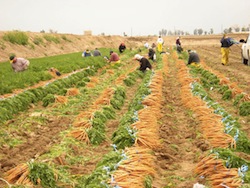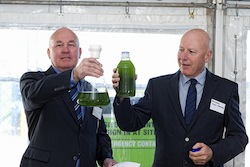The Senate Finance Committee has approved a bipartisan tax extenders package that includes aid for the alternative energy industry. The package includes the $1 per gallon biodiesel Blender’s Credit; an extension of the wind energy Production Tax  Credit; an extension of the Investment Tax Credit (ITC) for the development of offshore and community wind projects; and an extension of the producer tax credit for cellulosic biofuels. Passed 19-5, the bill now moves to the full Senate. From there, if passed, the package will head to the House.
Credit; an extension of the Investment Tax Credit (ITC) for the development of offshore and community wind projects; and an extension of the producer tax credit for cellulosic biofuels. Passed 19-5, the bill now moves to the full Senate. From there, if passed, the package will head to the House.
Both the biodiesel industry and the wind industry recognized the leaders of the bill including Chairman Max Baucus (D-MT) and Ranking Member Orrin Hatch (R-UT). In addition, Senator Maria Cantwell (D-WA) was a champion for reinstating the biodiesel tax credit.
Biodiesel producer Imperium Renewables is just one of dozens of biodiesel producers who will benefit from the measure should it become law. “This credit will enable us to increase production, and continue to support family wage jobs in Washington state,” said Imperium CEO John Plaza. “With the passage of the Tax Extenders Package out of the Senate Finance Committee, a strong message of bi-partisan support from the Senate leaders highlights the importance of a healthy, domestic biodiesel industry for the nation, and hopefully sets the tone for quick and successful passage in the Senate and the House.”
One of the strongest voices in Washington, DC regarding the reinstatement of the biodiesel tax credit was the National Biodiesel Board. Anne Steckel, vice president of federal affairs for the National Biodiesel Board, said, “This is a refreshing display of bipartisan cooperation to get this economy moving again. The biodiesel tax incentive is a proven job creator. Growth in our industry has been stagnant since the incentive expired on Dec. 31. Reinstating it will get biodiesel producers across the country back to expanding their businesses and hiring new employees, as they were doing last year with the tax incentive in place.”
Executive Director of the Advanced Ethanol Council Brooke Coleman noted, “Congress is right to take a hard look at all tax incentives for all energy industries, including fossil fuels. And we look forward to the day when we can restore parity to the tax code when it comes to energy development. But until that day comes, it is critical to maintain stability in the marketplace for emerging industries.”
 The passage of the wind energy production tax is expected to save nearly 37,000 jobs in wind energy and drives up to $20 billion a year of private investment into U.S. wind farms according to the American Wind Energy Association. “We applaud the committee for this act of leadership to move critical policies forward in a difficult environment,” said Denise Bode, CEO of the American Wind Energy Association. “This was an extremely important step to provide critical certainty to keep people at work in wind energy manufacturing and construction.”
The passage of the wind energy production tax is expected to save nearly 37,000 jobs in wind energy and drives up to $20 billion a year of private investment into U.S. wind farms according to the American Wind Energy Association. “We applaud the committee for this act of leadership to move critical policies forward in a difficult environment,” said Denise Bode, CEO of the American Wind Energy Association. “This was an extremely important step to provide critical certainty to keep people at work in wind energy manufacturing and construction.”
The next hurdle is the full Senate; fortunately there are strong wind energy supporters who are lobbying to see the wind energy tax credits extended: Sens. Michael Bennet (D-CO), John Boozman (R-AR), Scott Brown (R-MA), Tom Harkin (D-IA), Jerry Moran (R-KS), and Mark Udall (D-CO).
The bill is expected to go to the full Senate for deliberation as soon as tomorrow.
 Nearly all of the former employees of the plant were brought back and there are plans to hire additional employees. Cliff Meeuwsen said the plant is up and running at full capacity. ZFS also owns and operates corn and soybean processing plants in Nebraska and Michigan and is no stranger to operating agricultural businesses in times of challenges.
Nearly all of the former employees of the plant were brought back and there are plans to hire additional employees. Cliff Meeuwsen said the plant is up and running at full capacity. ZFS also owns and operates corn and soybean processing plants in Nebraska and Michigan and is no stranger to operating agricultural businesses in times of challenges.










